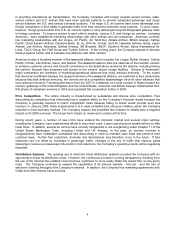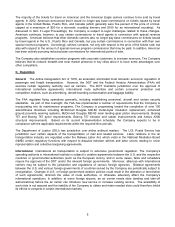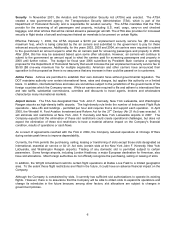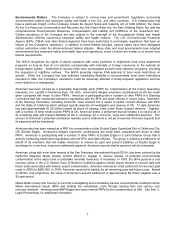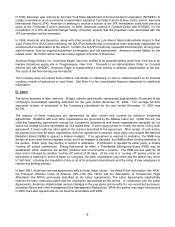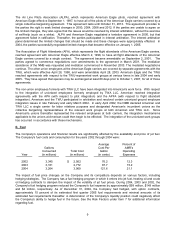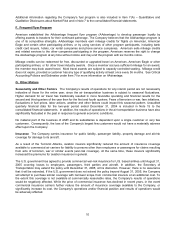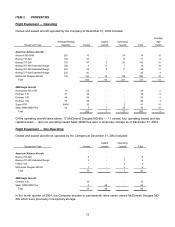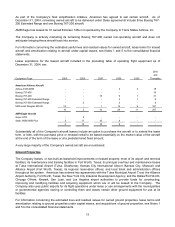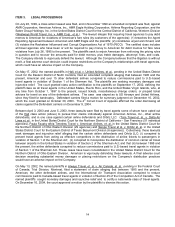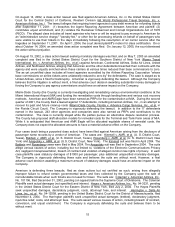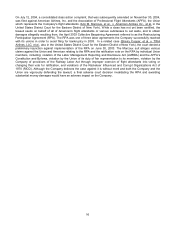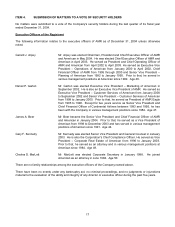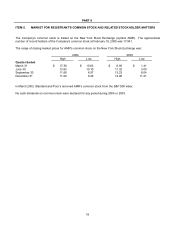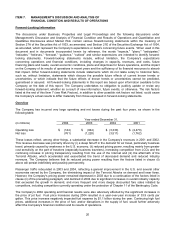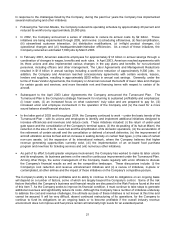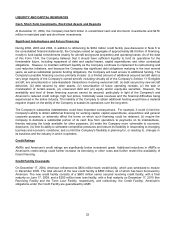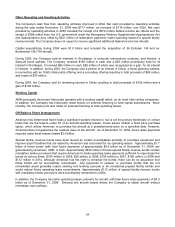American Airlines 2004 Annual Report Download - page 17
Download and view the complete annual report
Please find page 17 of the 2004 American Airlines annual report below. You can navigate through the pages in the report by either clicking on the pages listed below, or by using the keyword search tool below to find specific information within the annual report.
14
ITEM 3. LEGAL PROCEEDINGS
On July 26, 1999, a class action lawsuit was filed, and in November 1999 an amended complaint was filed, against
AMR Corporation, American Airlines, Inc., AMR Eagle Holding Corporation, Airlines Reporting Corporation, and the
Sabre Group Holdings, Inc. in the United States District Court for the Central District of California, Western Division
(Westways World Travel, Inc. v. AMR Corp., et al.). The lawsuit alleges that requiring travel agencies to pay debit
memos to American for violations of American’s fare rules (by customers of the agencies): (1) breaches the Agent
Reporting Agreement between American and AMR Eagle and the plaintiffs; (2) constitutes unjust enrichment; and
(3) violates the Racketeer Influenced and Corrupt Organizations Act of 1970 (RICO). The certified class includes
all travel agencies who have been or will be required to pay money to American for debit memos for fare rules
violations from July 26, 1995 to the present. The plaintiffs seek to enjoin American from enforcing the pricing rules
in question and to recover the amounts paid for debit memos, plus treble damages, attorneys’ fees, and costs.
The Company intends to vigorously defend the lawsuit. Although the Company believes that the litigation is without
merit, a final adverse court decision could impose restrictions on the Company’s relationships with travel agencies,
which could have an adverse impact on the Company.
On May 17, 2002, the named plaintiffs in Hall, et al. v. United Airlines, et al., pending in the United States District
Court for the Eastern District of North Carolina, filed an amended complaint alleging that between 1995 and the
present, American and over 15 other defendant airlines conspired to reduce commissions paid to U.S.-based
travel agents in violation of Section 1 of the Sherman Act. The plaintiffs are seeking monetary damages and
injunctive relief. The court granted class action certification to the plaintiffs on September 17, 2002, defining the
plaintiff class as all travel agents in the United States, Puerto Rico, and the United States Virgin Islands, who, at
any time from October 1, 1997 to the present, issued tickets, miscellaneous change orders, or prepaid ticket
advices for travel on any of the defendant airlines. The case was stayed as to US Airways and United Airlines,
since they filed for bankruptcy. Defendant carriers filed a motion for summary judgment on December 10, 2002,
which the court granted on October 30, 2003. The 4th Circuit Court of Appeals affirmed the order dismissing all
claims against the Defendant carriers on December 9, 2004.
Between April 3, 2003 and June 5, 2003, three lawsuits were filed by travel agents some of whom have opted out
of the Hall class action (above) to pursue their claims individually against American Airlines, Inc., other airline
defendants, and in one case against certain airline defendants and Orbitz LLC. (Tam Travel et. al., v. Delta Air
Lines et. al., in the United States District Court for the Northern District of California – San Francisco (51 individual
agencies), Paula Fausky d/b/a Timeless Travel v. American Airlines, et. al, in the United States District Court for
the Northern District of Ohio Eastern Division (29 agencies) and Swope Travel et al. v. Orbitz et. al. in the United
States District Court for the Eastern District of Texas Beaumont Division (6 agencies)). Collectively, these lawsuits
seek damages and injunctive relief alleging that the certain airline defendants and Orbitz LLC: (i) conspired to
prevent travel agents from acting as effective competitors in the distribution of airline tickets to passengers in
violation of Section 1 of the Sherman Act; (ii) conspired to monopolize the distribution of common carrier air travel
between airports in the United States in violation of Section 2 of the Sherman Act; and that (iii) between 1995 and
the present, the airline defendants conspired to reduce commissions paid to U.S.-based travel agents in violation
of Section 1 of the Sherman Act. These cases have been consolidated in the United States District Court for the
Northern District of Ohio Eastern Division. American is vigorously defending these lawsuits. A final adverse court
decision awarding substantial money damages or placing restrictions on the Company’s distribution practices
would have an adverse impact on the Company.
On May 13, 2002, the named plaintiffs in Always Travel, et. al. v. Air Canada, et. al., pending in the Federal Court
of Canada, Trial Division, Montreal, filed a statement of claim alleging that between 1995 and the present,
American, the other defendant airlines, and the International Air Transport Association conspired to reduce
commissions paid to Canada-based travel agents in violation of Section 45 of the Competition Act of Canada. The
named plaintiffs sought monetary damages and injunctive relief and to certify a nationwide class of travel agents.
On December 10, 2004, the court approved a motion by the plaintiffs to dismiss this action.


